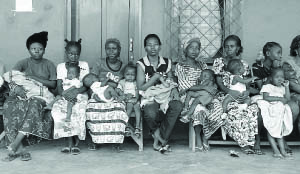By JULIUS PHIRI –
THE mission of Zambia’s health sector has been to provide equitable access to cost-effective, equality healthcare services as close to the family as possible.
Nevertheless, people in rural areas seem to be less than others because they have had less access to healthcare compared to the urban population.
Long distances to nearest health centres, traditional beliefs and the lack of adequate medicines in the available rural health centres have generated apathy in people towards seeking health services.
As if that is not bad enough, rural areas have greater difficulties in accessing better services in the health sector as they have been at the periphery of skilled and qualified manpower.
Needless to mention that urban and more prosperous areas of sub-Saharan Africa have disproportionately more of the countries’ skilled healthcare workers than rural areas.
For example, urban Zambia has 20 times more doctors and more than five times more nurses and midwives than the rural areas.
In Malawi, 87 per cent of the population lives in rural areas but 96.6 per cent of doctors are found in urban health facilities. Burkina Faso has one midwife per 8,000 inhabitants in richer zones and one per nearly 430,000 inhabitants in the poorest zone.
Apparently, lack of healthcare workers has resulted into unconventional ways of delivering healthcare to rural dwellers, including medical consultations by phone, travel grants, as well as mobile preventative and treatment programmes.
Various healthcare system levels have been provided in the country such as health posts which are first level primary care for rural areas, health centres and clinics, district hospitals as well as tertiary hospitals like University Teaching Hospital (UTH).
Since its independence, the country’s health facilities have seen a constant rise in patient numbers.
But the number of health centres has not corresponded with the rise in the number of patients or the country’s population.
Consequently, the country, particularly in rural areas, has witnessed deteriorating health services where people have been forced to walk long distances to access health service.
Like other remote areas detached from the line of rail, Eastern Province is one of the places whose people have been subjected to various challenges in accessing health services.
The Government is cognisant to this fact and recently announced that it is constructing 650 health posts across the country to enhance quality service delivery.
 Health Minister Emmanuel Kasonde said 57 of the 650 health centres would be constructed in Eastern Province at a cost of K36.2 million.
Health Minister Emmanuel Kasonde said 57 of the 650 health centres would be constructed in Eastern Province at a cost of K36.2 million.
This is in addition to the existing 207 health centres in the vast province.
With a total population of 1.8 million people, the Sunday Times looked at how the successful completion of the construction of the new health posts would make a difference among the people, particularly in the rural areas.
“Rural areas often have no modern healthcare and patients in these areas either rely on traditional medicine or travel long distances for healthcare,” said Morris Tembo, a resident of Kaigowe Village in Chief Nzamane’s area.
Mr Tembo said he was happy with the news that the Government planned to build more health centres in the area.
Naomi Banda of Katambo Village has been walking close to 10 kilometres to seek medical attention at Mwami Adventist Hospital, which is being run by the Seventh Day Adventist Church.
“It has always been difficult for me walking the long distances in search of medicine,” she said.
“How I wish we have a clinic every after five kilometres. This will help many people, especially pregnant women who have suffered to access the health services.”
Out the 57 health posts to be constructed in the province, Katete District would get 11 while Petauke has been allocated eight with Chadidza getting five.
Chipata District as well as Mambwe, Nyimba and Vubwi have all been allocated six health posts each.
“This is a good development,” added Ms Banda. “We have been walking long distances, approximately 10 kilometres to reach Mwami Adventist Hospital to seek medical services, and hope one of the posts is coming to my area.”
It is important that the Government has put a deliberate policy to construct health posts in rural areas like Katambo which is densely populated, she added.
According to Dr Kasonde, the health posts to be constructed would of modern prefabricated materials to allow for speedy installation and operationalisation of the health facilities.
The main building would comprise delivery suite, a post-natal ward, screening and treatment room.
“The construction of the health centres will improve the livelihood of the people in various communities,” said Samson Jere of Feni Village in Mpezeni’s area.
“The women have suffered a great deal, and I believe this is the solution to the health challenges in villages like mine.”
Tina Ngulube of Lundazi District said construction of the health posts was timely as people in rural areas had continued to suffer in accessing health services.
“It is not easy and the lives of the people, especially pregnant mothers, are no longer guaranteed,” she said.
“We have seen some NGOs that have come to help but it’s like they have limited capacity and I am happy that the Government is now realising the need to enhance health service delivery in rural areas.”
While the construction of the health posts may not act as a permanent solution to the health challenges in Eastern Province, Dr Kasonde hoped that it would go a long way in enhancing service delivery.
He said health posts would include the supply of essential medicals as well as solar power to ensure effective running of the facilities.
“As Government, we have planned that once the construction is completed, staff will immediately be deployed for the health posts to be functional without delays,” he said.
The investments in the health posts is in line with the desire of the Government to construct health posts to cater for every 500 households in rural areas and for every 1,000 households in urban areas for every five kilometres in sparsely populated areas.
But this will surely need sustained investment in the health sector that will produce adequate medicines, skilled manpower and retained staffing levels in rural health centres.
Needless to state that it will be crucial for every individual in all parts of the country to offer necessary support and ensure that the ambitious project of constructing the health posts does not turn into a mere dream.
Who knows? This could be a spring board for economic development for the rural population as it is said that health population is key to prosperity!







